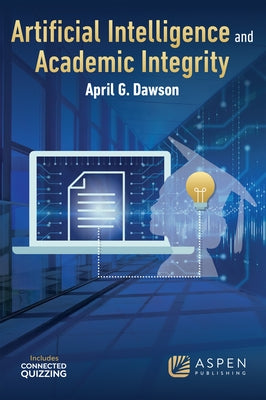Aspen Publishing
Artificial Intelligence and Academic Integrity
Artificial Intelligence and Academic Integrity
Couldn't load pickup availability
Artificial Intelligence and Academic Integrity, by April G. Dawson, is Aspen's concise primer intended to increase student awareness of the protocols, possibilities, and ethical implications of using AI systems in their legal education studies, while also giving professors assurance that their students are informed of the same.
AI is having a sudden and profound impact on the legal profession, as it has in virtually professions worldwide. Understanding how to leverage AI tools effectively and appropriately will give law school graduates a competitive edge among legal employers interested to hire tech-savvy young lawyers.
But AI is also having a profound impact on the legal education experience. As more and more students seek assistance from ChatGPT and similar tools for their academic work, questions arise as to what they are gaining or sacrificing in the process; and whether, or at what point, using AI in academic work falls within the bounds of academic integrity.
Such dramatic developments call for better knowledge and understanding of the ethical implications associated with using AI systems in law school. April G. Dawson explores the pros and cons of using powerful AI tools in law school while maintaining institutional standards for academic rigor and intellectual honesty in legal education--alongside students' own values and developing sense of legal ethics.
Professors and students will benefit from:
Assurance that AIAI raises student awareness of the importance of 1) using generative AI tools like ChatGPT responsibly; and 2) understanding how academic integrity facilitates learning and prepares students to become ethically responsible in the practice of law; 3) researching and reading their school's code of conduct, and 4) understanding the policies of individual professors with respect to the use of generative AI tools.
Reflection: Professional Identity Formation (PIF), questions that prompt students to reflect on their own experiences with generative AI--both its useful applications for learning and practice, as well as the potential for using AI in ways that violate academic integrity and undermine principles of professional responsibility.
Examples of individuals making choices and realizing the consequences of their decisions for a range of situations and ethical quandaries
Case Studies feature summaries of recent landmark cases and discussion of law and policy.
A concise overview of law-specific AI products, the tasks they perform, and the reasons for the legal profession's measured approach to adopting them
Incisive discussion of the potential for generative AI's to significantly mitigate, though not fully address, the nation's access to justice crisis
Author: April G. Dawson
Publisher: Aspen Publishing
Published: 08/02/2023
Pages: 88
Binding Type: Paperback
Weight: 0.45lbs
Size: 8.80h x 6.50w x 1.30d
ISBN13: 9798889066941
ISBN10: 8889066946
BISAC Categories:
- Law | Legal Writing
- Law | Research
- Law | Legal Education
Share

